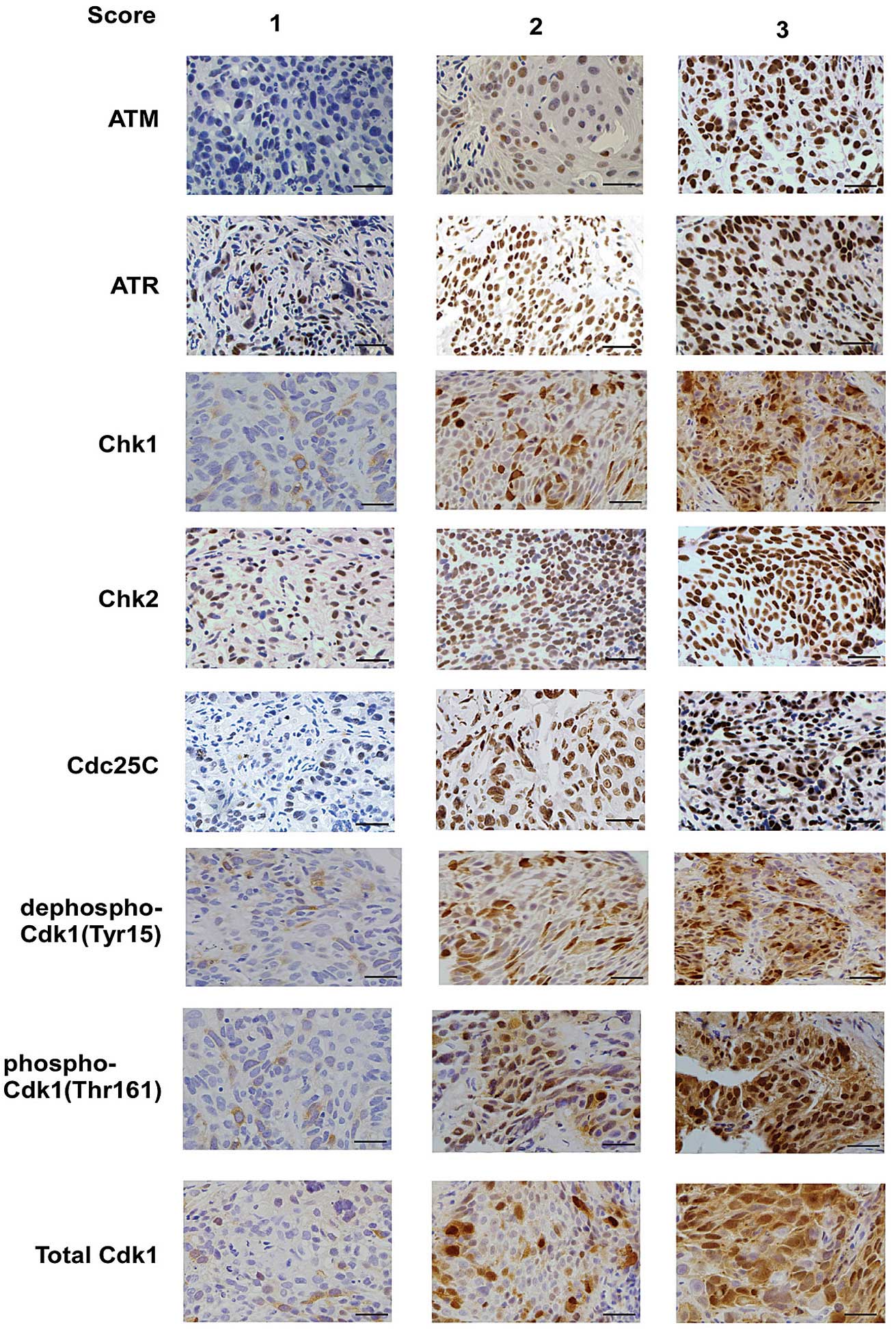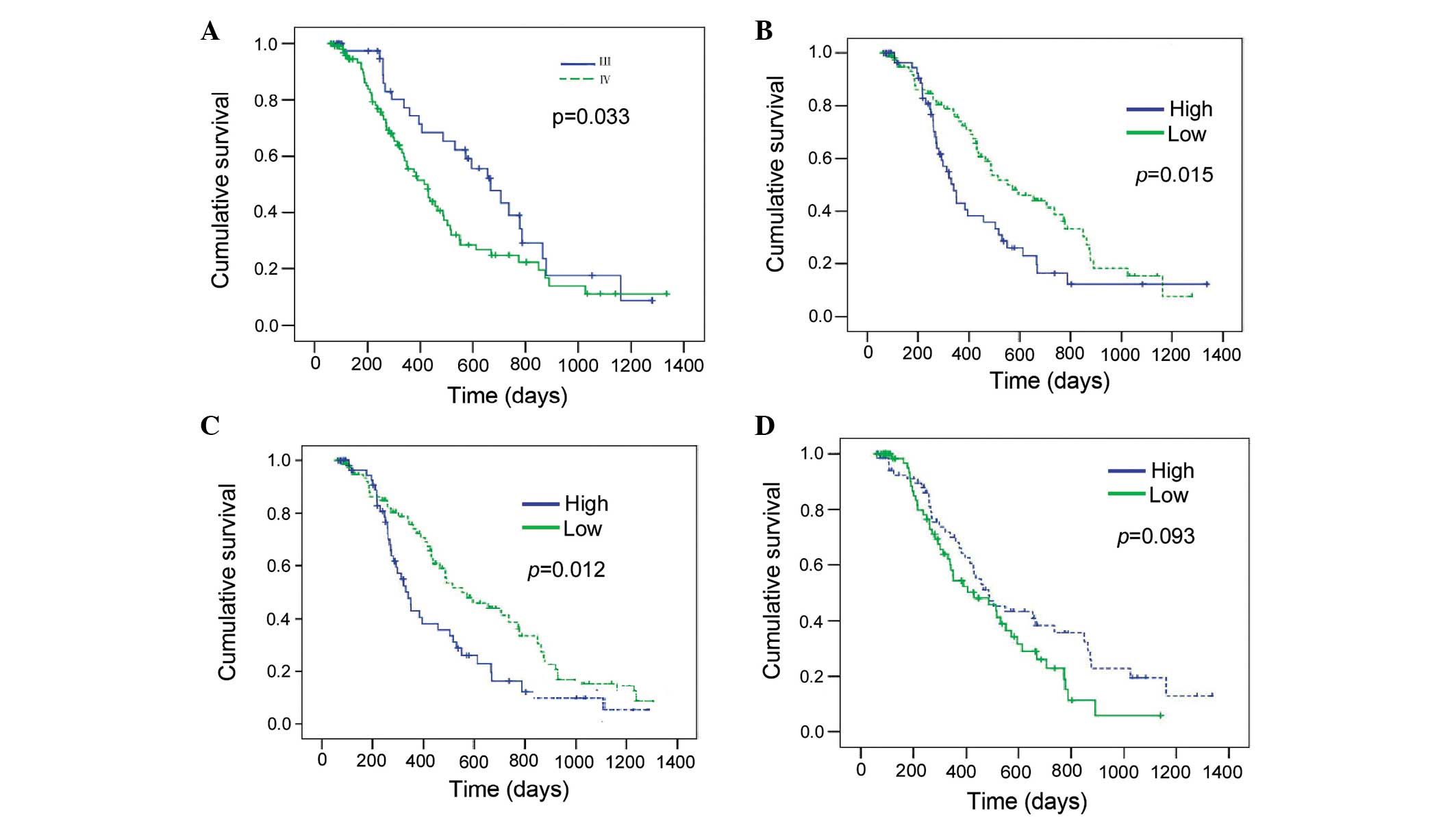|
1
|
Siegel R, Naishadham D and Jemal A: Cancer
statistics, 2013. CA Cancer J Clin. 63:11–30. 2013. View Article : Google Scholar : PubMed/NCBI
|
|
2
|
Travis WD, Brambilla E and Riely GJ: New
pathologic classification of lung cancer: relevance for clinical
practice and clinical trials. J Clin Oncol. 31:992–1001. 2013.
View Article : Google Scholar : PubMed/NCBI
|
|
3
|
Dickhoff C, Hartemink KJ, van de Ven PM,
et al: Trimodality therapy for stage IIIA non-small cell lung
cancer: benchmarking multi-disciplinary team decision-making and
function. Lung Cancer. 85:218–223. 2014. View Article : Google Scholar : PubMed/NCBI
|
|
4
|
Somasundaram A, Socinski MA and Burns TF:
Personalized treatment of EGFR mutant and ALK-positive patients in
NSCLC. Expert Opin Pharmacother. 15:2693–2708. 2014. View Article : Google Scholar : PubMed/NCBI
Omolo B, Carson C, Chu H, Zhou Y, Simpson
DA, Hesse JE, Paules RS, Nyhan KC, Ibrahim JG and Kaufmann WK: A
prognostic signature of G(2) checkpoint function in melanoma cell
lines. Cell Cycle. 12:1071–1082. 2013. View
Article : Google Scholar : PubMed/NCBI
|
|
5
|
Smith J, Tho LM, Xu N and Gillespie DA:
The ATM-Chk2 and ATR-Chk1 pathways in DNA damage signaling and
cancer. Adv Cancer Res. 108:73–112. 2010. View Article : Google Scholar : PubMed/NCBI
|
|
6
|
Nieborowska-Skorska M, Stoklosa T, Datta
M, Czechowska A, Rink L, Slupianek A, et al: ATR-Chk1 axis protects
BCR/ABL leukemia cells from the lethal effect of DNA double-strand
breaks. Cell Cycle. 5:994–1000. 2006. View Article : Google Scholar : PubMed/NCBI
|
|
7
|
Gatei M, Sloper K, Sorensen C, Syljuäsen
R, Falck J, Hobson K, et al: Ataxia-telangiectasia-mutated (ATM)
and NBS1-dependent phosphorylation of Chk1 on Ser-317 in response
to ionizing radiation. J Biol Chem. 278:14806–14811. 2003.
View Article : Google Scholar : PubMed/NCBI
|
|
8
|
Huang M, Miao ZH, Zhu H, Cai YJ, Lu W and
Ding J: Chk1 and Chk2 are differentially involved in homologous
recombination repair and cell cycle arrest in response to DNA
double-strand breaks induced by camptothecins. Mol Cancer Ther.
7:1440–1449. 2008. View Article : Google Scholar : PubMed/NCBI
|
|
9
|
Sanchez Y, Wong C, Thoma RS, Richman R, Wu
Z, Piwnica-Worms H and Elledge SJ: Conservation of the Chk1
checkpoint pathway in mammals: linkage of DNA damage to Cdk
regulation through Cdc25. Science. 277:1497–1501. 1997. View Article : Google Scholar : PubMed/NCBI
|
|
10
|
Peter M, Le Peuch C, Labbé JC, Meyer AN,
Donoghue DJ and Dorée M: Initial activation of cyclin-B1-cdc2
kinase requires phosphorylation of cyclin B1. EMBO Rep. 3:551–556.
2002. View Article : Google Scholar : PubMed/NCBI
|
|
11
|
Fesquet D, Labbé JC, Derancourt J, Capony
JP, Galas S, Girard F, et al: The MO15 gene encodes the catalytic
subunit of a protein kinase that activates cdc2 and other
cyclin-dependent kinases (CDKs) through phosphorylation of Thr161
and its homologues. EMBO J. 12:3111–3121. 1993.PubMed/NCBI
|
|
12
|
Poon RY, Chau MS, Yamashita K and Hunter
T: The role of Cdc2 feedback loop control in the DNA damage
checkpoint in mammalian cells. Cancer Res. 57:5168–5178.
1997.PubMed/NCBI
|
|
13
|
Edge SB, Byrd DR, Compton CC, et al: Lung.
AJCC Cancer Staging Manual. Seventh Edition. Springer; New York,
NY: pp. 299–324. 2010
|
|
14
|
Travis WD, Brambilla E, Muller-Hermelink
HK and Harris CC: Tumors of the lung. Pathology and Genetics of
Tumours of the Lung, Pleura, Thymus and Heart. IARC Press; Lyon:
pp. 1–68. 2004
|
|
15
|
Fisher D: Control of DNA replication by
cyclin-dependent kinases in development. Results Probl Cell Differ.
53:201–217. 2011. View Article : Google Scholar : PubMed/NCBI
|
|
16
|
Lee KH, Min HS, Han SW, Oh DY, Lee SH, Kim
DW, et al: ERCC1 expression by immunohistochemistry and EGFR
mutations in resected non-small cell lung cancer. Lung Cancer.
60:401–407. 2008. View Article : Google Scholar
|
|
17
|
Koh Y, Jang B, Han SW, Kim TM, Oh DY, Lee
SH, et al: Expression of class III beta-tubulin correlates with
unfavorable survival outcome in patients with resected non-small
cell lung cancer. J Thorac Oncol. 5:320–325. 2010. View Article : Google Scholar : PubMed/NCBI
|
|
18
|
Chansky K, Sculier JP, Crowley JJ, Giroux
D, Van Meerbeeck J and Goldstraw P: International Staging Committee
and Participating Institutions: The International Association for
the Study of Lung Cancer Staging Project: prognostic factors and
pathologic TNM stage in surgically managed non-small cell lung
cancer. J Thorac Oncol. 4:792–801. 2009. View Article : Google Scholar : PubMed/NCBI
|
|
19
|
Buccheri G and Ferrigno D: Prognostic
value of stage grouping and TNM descriptors in lung cancer. Chest.
117:1247–1255. 2000. View Article : Google Scholar : PubMed/NCBI
|
|
20
|
Wu M, Zhao J, Song SW, Zhuo M, Wang X, Bai
H, et al: EGFR mutations are associated with prognosis but not with
the response to front-line chemotherapy in the Chinese patients
with advanced non-small cell lung cancer. Lung Cancer. 67:343–347.
2010. View Article : Google Scholar
|
|
21
|
Yang P, Kulig K, Boland JM,
Erickson-Johnson MR, Oliveira AM, Wampfler J, et al: Worse
disease-free survival in never-smokers with ALK+lung
adenocarcinoma. J Thorac Oncol. 7:90–97. 2012. View Article : Google Scholar
|
|
22
|
Asahina H, Yamazaki K, Kinoshita I, Sukoh
N, Harada M, Yokouchi H, et al: A phase II trial of gefitinib as
first-line therapy for advanced non-small cell lung cancer with
epidermal growth factor receptor mutations. Br J Cancer.
95:998–1004. 2006. View Article : Google Scholar : PubMed/NCBI
|
|
23
|
Shaw AT, Kim DW, Nakagawa K, Seto T, Crinó
L, Ahn MJ, et al: Crizotinib versus chemotherapy in advanced
ALK-positive lung cancer. N Engl J Med. 368:2385–2394. 2013.
View Article : Google Scholar : PubMed/NCBI
|
|
24
|
Choi CM, Yang SC, Jo HJ, Song SY, Jeon YJ,
Jang TW, et al: Proteins involved in DNA damage response pathways
and survival of stage I non-small-cell lung cancer patients. Ann
Oncol. 23:2088–2093. 2012. View Article : Google Scholar : PubMed/NCBI
|
|
25
|
Grabauskiene S, Bergeron EJ, Chen G, Chang
AC, Lin J, Thomas DG, et al: CHK1 levels correlate with
sensitization to pemetrexed by CHK1 inhibitors in non-small cell
lung cancer cells. Lung Cancer. 82:477–484. 2013. View Article : Google Scholar : PubMed/NCBI
|
|
26
|
Wu W, Fan YH, Kemp BL, Walsh G and Mao L:
Overexpression of cdc25A and cdc25B is frequent in primary
non-small cell lung cancer but is not associated with
overexpression of c-myc. Cancer Res. 58:4082–4085. 1998.PubMed/NCBI
|
|
27
|
Abdulkader I, Sánchez L,
Cameselle-Teijeiro J, Gude F, Chávez JE, López-López R, et al:
Cell-cycle-associated markers and clinical outcome in human
epithelial cancers: a tissue microarray study. Oncol Rep.
14:1527–1531. 2005.PubMed/NCBI
|
|
28
|
Lamberto I, Plano D, Moreno E, Font M,
Palop JA, Sanmartín C and Encío I: Bisacylimidoselenocarbamates
cause G2/M arrest associated with the modulation of CDK1 and Chk2
in human breast cancer MCF-7 cells. Curr Med Chem. 20:1609–1619.
2013. View Article : Google Scholar : PubMed/NCBI
|
|
29
|
Chow JP and Poon RY: The CDK1 inhibitory
kinase MYT1 in DNA damage checkpoint recovery. Oncogene.
32:4778–4788. 2013. View Article : Google Scholar
|
|
30
|
Chang HY, Shih MH, Huang HC, Tsai SR, Juan
HF and Lee SC: Middle infrared radiation induces G2/M cell cycle
arrest in A549 lung cancer cells. PLoS One. 8:e541172013.
View Article : Google Scholar : PubMed/NCBI
|
|
31
|
Xiao D, Zeng Y, Hahm ER, Kim YA,
Ramalingam S and Singh SV: Diallyl trisulfide selectively causes
Bax- and Bak-mediated apoptosis in human lung cancer cells. Environ
Mol Mutagen. 50:201–212. 2009. View
Article : Google Scholar :
|
|
32
|
Vassilev LT, Tovar C, Chen S, Knezevic D,
Zhao X, Sun H, et al: Selective small-molecule inhibitor reveals
critical mitotic functions of human CDK1. Proc Natl Acad Sci USA.
103:10660–10665. 2006. View Article : Google Scholar : PubMed/NCBI
|
|
33
|
Raghavan P, Tumati V, Yu L, Chan N,
Tomimatsu N, Burma S, et al: AZD5438, an inhibitor of Cdk1, 2, and
9, enhances the radiosensitivity of non-small cell lung carcinoma
cells. Int J Radiat Oncol Biol Phys. 84:e507–e514. 2012. View Article : Google Scholar : PubMed/NCBI
|
















